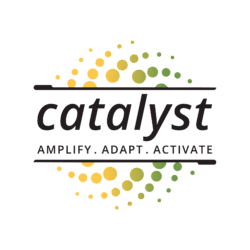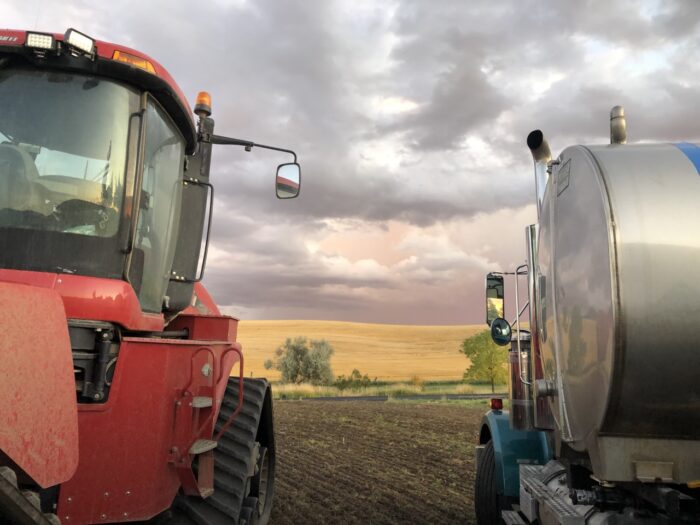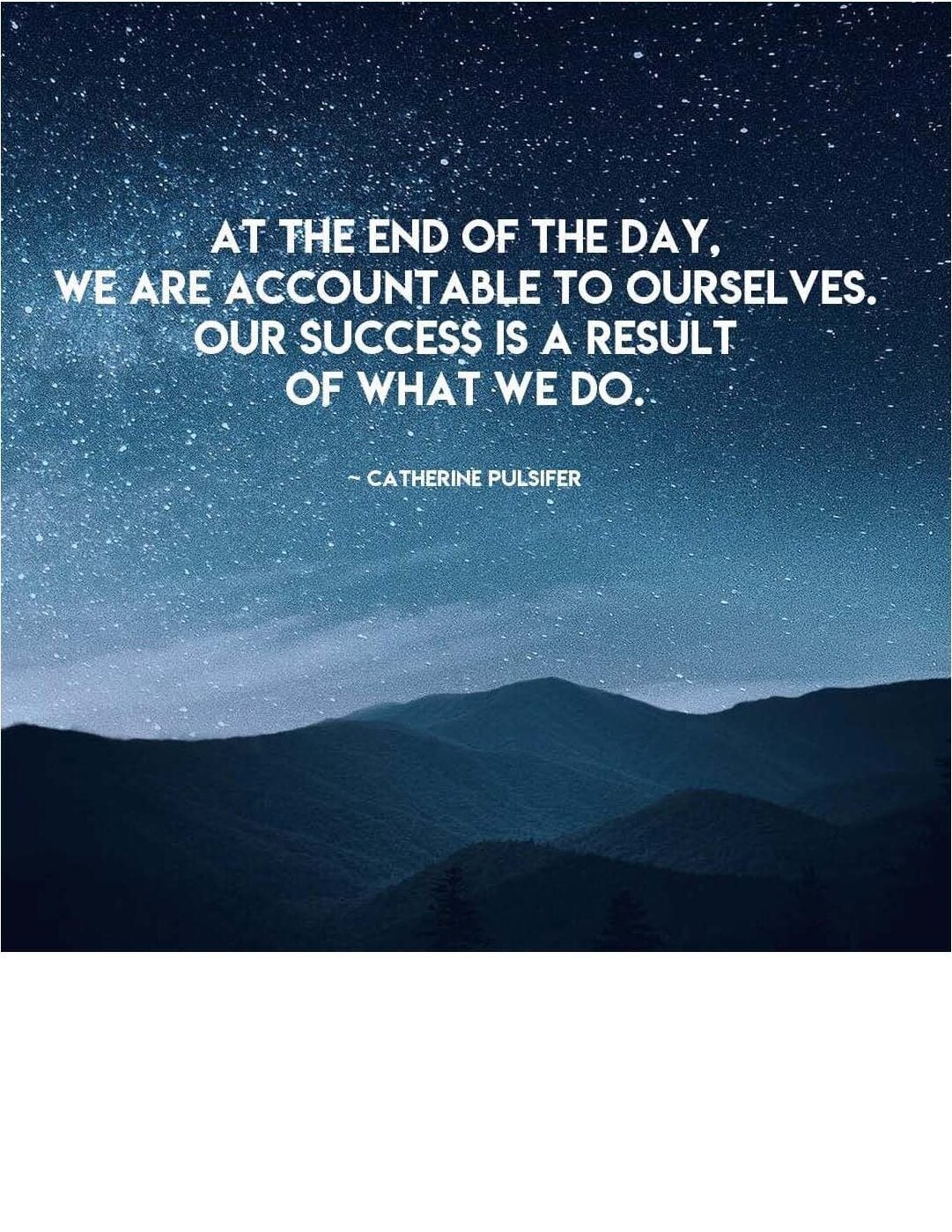Living Our Practices Submissions: November 2022
Thank You for Joining the Conversation!
“Living Our Practices” contest explores our Cultural Pillars and Practices
In November we asked: What are some ways you demonstrate Personal Accountability?
A big “thank you” to everyone who submitted in November’s contest. Check out the responses!

Don Sauve (Corporate)
After I have worked with someone on a request (whether it be a new feature, help with understanding something, or fixing something), I will often follow up after my part of the work is done to make sure the requester is satisfied with the outcome and to ensure there are no loose ends. Usually this is a quick email or message back and forth, but sometimes additional opportunities for improvement surface in this process. It really doesn’t take long to confirm that my “customer” is satisfied, and it could lead to even greater customer satisfaction down the road.

Katie Nix (Nutrition)
Holding myself personally accountable has shifted a bit since moving from a large office with team members to working form home.
One way I keep demonstrate personally accountability is to stay connected with my manager via Teams. I try to give daily updates in the chat or find a few minutes every few days to have short conversations to make sure I am making progress. Making sure I stay well connected encourages me to stay on track.
Another way I demonstrate personally accountability is by making sure I stay focused on what my yearly goals are. As my role within the company has changed this year, making sure I created a new gaol made me accountable right away for what I wanted to achieve in my new position.
Making a concerted effort to discuss how I can improve and achieve my goals with my Wilbur Ellis mentor is another successful way I have found to hold myself personally accountable for growth in my current position.

Colby Albright (Agribusiness)

Personal Accountability to me is about inspiration, a feeling of being and a feeling of purpose.
I have this continuous thought that my actions whether positive or negative will directly influence others whether that is my customers or my coworkers. And that, can most definitely start a domino effect. And this goes even beyond the scope of where I work.
A smile and a kind word can sometimes be the greatest part of someone else’s day. That is a gift worth giving.
I can think of many times where my entire day was changed by the actions of another, and I have realized that there is power in that. We have the power to influence the life of others by what we say and what we do.
I choose to be a light in my world. And in that I have seen how my influence can tip the scale to brighten someone’s day which can and usually carry over into the lives of others.
I sometimes ponder how my influence has changed the world through a simple chain of events started by something that I said to or did for someone. That could be as small as someone “paying it forward” at their favorite coffee shop or as big as someone helping another fighting a ongoing battle of depression.
These are things that I may never see or know about, but I have total faith and believe that though I am just one person, I CAN make a difference. Even if it is by nothing more than a mere smile, a genuine compliment or asking a coworker if I can assist in a project they may be working on.
Personal accountability is being the best employee, friend and human that I can, and it has the potential of changing lives which I like to believe can change the world. It’s simple but the outcome can be tremendous.

Mallory Robert (Agribusiness)
Personal accountability all boils down to integrity. The true definition of integrity, according to Webster’s Dictionary is, “…firm adherence to a code of especially moral or artistic values; incorruptibility…” To put it more simply, “what are you going to do when no one is watching?” I think our team strives to have the upmost integrity in all our daily tasks by doing what is right, especially “when no one is looking”. We try to surround ourselves by people who hold similar values, and that’s what makes our team so great. We do what is right and can count on each other knowing they will do the best practice. Ultimately, our jobs are going to be done correctly and safer as no one is skipping corners or taking short cuts. Those actions go against integrity and personal accountability…and that’s not at our location. We are all better off for it and I feel like I can speak for our team by saying we are thankful that everyone values personal accountability and is proud to be part of a team that puts this quality so high.

Russ Stowers (Agribusiness)
Lead by example concerning safety practices, policies, and PPE.
Impeccable attendance / teammate and customer availability –

Connor Ferguson (Agribusiness)
Personal accountability starts with having a clear vision of who you are. The visual in the video on personal accountability showed the character looking into a mirror and I think this is the perfect way to make this value concrete. Personal accountability means being able to look into a mirror and consider whether the values I am living in my job at Wilbur-Ellis are reflected properly. It also means being able to look into the mirror and be sure that I am living up to the expectations and values that I expect my team to demonstrate each day. By taking a serious and thoughtful look into the mirror, I can be sure that I am living by the same standards that I expect others to.
Personal accountability also means being the first to admit when they are wrong and welcome that vulnerability in my team. As a team leader, I must be willing to take the first step – especially when most difficult, to admit when I was wrong or if something didn’t turn out as it had been expected to. Having a clear sense of who I am will help me to speak up when needed to and to take responsibility for the team when something doesn’t turn out like it should.
By working to have personal accountability in every area of my life, this becomes a lived practice. Whether it’s at home or work, by living my life as if I can see every action in a mirror even when no one is around, will help me to improve areas of weakness and grow in areas of strength. It will also hold me to doing the right thing each time – even if that means taking more time or energy to complete the task. Being personally accountable will lead to a higher performing team, a happier team, and a team that thrives at Wilbur-Ellis.

Jay Rajgor (Connell)
- Awareness – first I need to know what are my responsibilities under my Job and then only I can be accountable for them. Its very important to have total clarity on this.
- Transparency – I need to be transparent regarding the skills that I have for fulfilling the responsibilities and If I need help, then I should ask for it.
- Ownership – If I had made a mistake, the first step is to admit it! and accept the ownership of result.
- Correction : Apologize for the mistake and take the responsibility to put in the effort to correct the situation from where it is.
- Time Discipline – using time wisely is very important and there would be certain tasks / colleagues dependent on my task results and hence need to prioritize tasks effectively.
- Over commitment – Taking on too much will likely cause me to miss the deadline. Hence I need to be realistic about what i can fit into my total workload.
- Reflection and improvement- It is very important to get feedback and ask self, “What could I have done differently?” this will help me improve over the course of time.

SYLVIA D’SOUZA (Connell)
Personal Accountability means “Responsible for One’s Own Actions”
Tips to demonstrate personal accountability: Define & understand your own role, manage time, apologize, be honest, understand your own limit and don’t over commit. In short take ownership of your role like you are the owner of the business.

Julie Magnuson (Nutrition)
As a manager, here are a few things I do to hold myself accountable.
1) Keep organized:
I use my Outlook/Teams calendar for task and meeting reminders (Hint: if you have to snooze the task more than once, move it to another time/day. If there is a deadline, make it a priority and get it done)
I help the team by showing actual work, ways to do the work, scheduling time as well as how to keep it organized without a lot of “noise” that can distract us. “Noise” such as excessive folders and subfolders, files, duplication of information and how to avoid those pitfalls.
2) Be available:
I hold monthly one-on-one meetings with each Team member.
In addition to the formally scheduled time, I make sure I am regularly available to my team. They are encouraged to Teams message or call me anytime and I reply as promptly as possible.
I also meet with my manager weekly to debrief, for guidance, and partner with for the success of the business. I am just as responsible to be available to him as I am to my own team members.
3) Communicate clearly and effectively:
If I am going to be unavailable for a period of time, I message or email my team.
I also ask team members to use a shared calendar for planned absences as well as Teams group chats.
I’ve worked with the team on a consistent and organized system for clear and effective work instructions for cross training. This will enable them to help cover each other’s work when they are out or need additional help for those times when there is an increase in business. It is also great for training new folks! When a system is in place, you do not have to reinvent the wheel!
4) Own my part:
Do the people you work with know that you care about them? I express respect, care and concern for each person. Bottom line, no matter the position in the company we all matter and have value. It is of the utmost importance that people know you care about and believe in them.
If a team member is struggling with their role, I coach, guide, and answer questions to help them be successful. If they are not successful, we develop a plan together. A previous mentor of mine learned from one of his and taught me, if you have a person on your team struggling, you own that and have a responsibility to work with them.
5) Set goals:
I set goals and work with my team and/or manager to reach those goals. The goals are tied to the company strategy. I also work with each team member on setting their own goals.

JessLynn Naumann (Agribusiness)
To me demonstrating personal accountability means to do your best and if you make mistakes learn from them. If I learn something new I always try and share with coworkers because they also may not had prior knowledge. Always share and celebrate successes for everyone no matter how little they may be. Acknowledging someone has done a great job always makes them feel better and makes them want to strive to continue to do great things.


Frederick van Biljon (Agribusiness)
I can demonstrate personal accountability by keeping the custom application equipment maintained and serviced so they are ready to hop in at any time for our customers allowing us to provide efficient and effective service.

Braidie Butters (Agribusiness)
I can demonstrate personal accountability by making sure I arrive to work on time and prepared for the tasks that lay ahead of me!

Michael Doerr (Agribusiness)
I just want everyone on our team to have the freedom to aim really high, knowing that there is risk in thinking of new and creative ways to serve our customers. Not everything will work, but the alternative of continuing to do business the way we have always done it carries a greater risk of being irrelevant to innovative customers. We continue to celebrate those that try new things, elevate the learnings to the larger group, and shine a light on those that are moving our business forward everyday.

Phil Gilbert (Agribusiness)
I have several ways that I use to demonstrate personal accountability by asking those employees that report to me to give feedback on anything that they feel I am not providing to them. In each evaluation, I like to leave time for them to give me an “evaluation” if they are willing to help promote this strategy. Not all are comfortable with providing this feedback, but when they do, I want to listen and think about how I can change or adapt to improve.
Another very simple strategy that I use is Outlook Calendar. By dragging and dropping emails that need follow-up to my calendar, I can make sure that I stay on task throughout the day, week, etc.
Lastly, each Monday morning, I like to write down my “Top 5 List”. This is a list of 5 priorities that I know I need to focus on for the week and I can check them off as they are completed. This also goes on my white board in my office.

Jocellyne Fernandes (Agribusiness)
A few ways I keep myself accountable are by staying organized and agile. I immediately assess projects as they flow to me, so I can assign priority and give an accurate timeline for completion. You can set regular work periods in your calendar to make sure that you are giving appropriate attention to tasks or projects you are involved in. Another key accountability trick is to remain fully transparent in all you do. This trick keeps me motivated to stay on track. If you run into a roadblock or a speed bump, you can reassess and keep the progress you have made, while refocusing on what needs to be accomplished.

Angela Lister (Agribusiness)
I demonstrate personal accountability by owning up to a mistake when I make one and taking personal ownership of fixing it.

Victoria Long (Corporate)
I take personal responsibility by taking ownership in my work, I always strive to meet all deadlines and always ask for feedback on projects. I want my work to reflect my dedication to the company.

Shawn West (Nachurs)
Understand Your Role in the Situation.
Be Honest With Everyone (Including Yourself) set coals that you can reach.
Be Quick to Apologize.
Manage Your Time Wisely.
Know Your Limits. don’t shoot for goals that you know cant be reached. start small then big!
Be Open to Change. this is one of the hardest things for people to do!
Be Outcome Driven.

Doris Deuser (Nachurs)
When you make a mistake, get in front of it. Apologize, fix it and move on. Excuses don’t replace solutions.

Daniel Groves (Agribusiness)
For awhile, I’ve asked my customers what they see and what I could be doing better to ultimately serve there business more effectively.

Christopher Gonzales (Nutrition)
I have thought heavily about cultural pillars, and I have concluded that a cultural pillar doesn’t always mean it’s a core value that supports positivity, or good things. In fact, there are leaders in criminality-minded cultures, who, in reality, uphold their pillars of beliefs and values with conviction. So, what separates our cultural pillars from those who aim to do harm, and bad things, in our society? …well, I would have to strongly say it is our practices that separates us from others.
Personal accountability is a practice, better yet an action, that is a fantastic elemental start in being a person of strong, positive, values. But, of course, we all want to say we are full of honor and goodness, but I will be the first to say I have failed much in being accountable; I had realized, many years ago, that failure gave me the opportunity to gain traction toward success, implementing personal accountability any chance I could.
Personal accountability is multifaceted, it can look like many different things, which is why I am okay with focusing on one facet at a time. I may focus on being sorry, when I inadvertently hurt somebody’s feelings, even when I feel I did nothing wrong; key focus: empathy. I may focus on the fact that I may not be a team player, when required, and start to mend relationships with my colleagues; main focus: relational development. I may focus on my inclination to tell “white lies,” (you know, truths that really don’t hurt anybody), and decide to start to tell the full truth; key focus: honesty & integrity. Personal accountability is not only for others, but its also for myself. If I become a better me, then I could possibly offer more to others.
Personal accountability is one practice you can live out to ensure someone is getting the best of you.